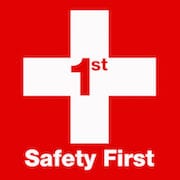
Food Allergy Awareness Week (May 10-16) is a time to educate the public about life-threatening food allergies. And advocate for more research and better treatment options.
According to Food Allergy Research & Education (FARE), 32 million Americans have potentially life-threatening food allergies. Additionally, one in every 13 children live with a food allergy, which breaks down to about 2 children in every U.S. classroom.
Food allergies reactions can vary – unpredictably – from mild to severe. Meaning just because you or a loved one experienced a mild reaction in the past, doesn’t mean the next time won’t be severe. And vice versa.
COMMON FOOD ALLERGENS
Nearly any food can trigger an allergic action. But there are nine types of food that cause the majority of allergic reactions. These include:

- Cow’s milk
- Egg
- Peanut
- Soy
- Wheat
- Tree Nut
- Shellfish
- Fish
- Sesame
While these allergens account for about 90% of all reactions, there are many other less common food allergies.
Food allergies can develop at any age, including well into adulthood. And even if you’ve safely eaten that food before.
Fortunately, children may outgrow certain food allergies (e.g. milk, egg, soy and wheat). But that isn’t always the case. So, the whole family should adapt and take steps to stay safe.
RESPONDING TO AN ALLERGIC REACTION
An allergic reaction can quickly cause swelling of the airway and a sudden drop in blood pressure, which may be life-threatening.
If you recognize signs of an allergic reaction (e.g. hives or rash, difficulty breathing, swelling in the face, throat or tongue, etc.), you should immediately:
- Call 911 and keep the person calm.
- Help the person use his epinephrine auto-injector if allowed by your state and local regulations.
- Monitor the person’s response and breathing.
- Consider giving a repeat dose if signs persist and EMS will not arrive for 5-10 minutes.
For additional resources during Food Allergy Awareness Week, check out FARE’s calendar of online events.
By American Safety and Health Institute and used with permission. Originally published here.
